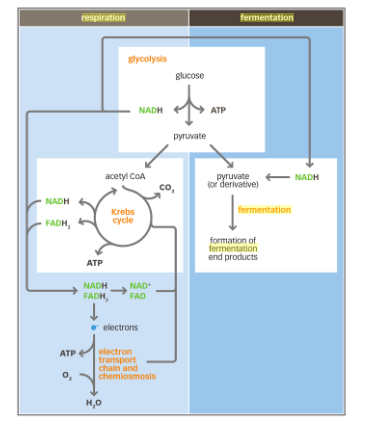Is glycolysis the beginning part of fermentation, or does fermentation follow glycolysis?
I see conflicting information from different sources
https://honchemistry.wikispaces.com/Lactic+Acid+and+Alcohol+Fermentation+in+Humans
"..Alcohol fermentation follows glycolysis, just like lactic acid fermentation..." <-- So glycolysis is preceding fermentation, not part of fermentation
and
" The Actual Fermentation Part
Glycolysis and fermentation are two separate processes. Glycolysis was explained briefly to give the reader an idea of the events leading up to fermentation and the starting conditions in terms of molecules available for reaction.....Going into the fermentation, the molecules NADH and pyruvic acid are present. " <--- so glycolysis is preceding fermentation, not part of fermentation.
Whereas these two links put glycolysis as part of fermentation, not a preceding stage before fermentation.
"Fermentation and cellular respiration begin the same way, with glycolysis" <-- glycolysis is part of fermentation, not preceding it.
and
http://study.com/academy/lesson/anaerobic-respiration-lactic-acid-alcoholic-fermentation.html
"fermentation, which is a process that anaerobically generates ATP by performing glycolysis..." <-- fermentation includes glycolysis, so glycolysis is part of fermentation, not preceding it.
So, which is it?
Is it a)like khanacademy and study.com, or b)like honchemistry.wikispaces.com
I have heard the idea that glycolysis is independent, in that it can produce some (not much, but some), energy on its own, and it can happen without fermentation or cellular respiration following. Though when would glycolysis occur without fermentation or respiration following? And even if glycolysis is that independent, it may still be at the beginning of respiration and fermentation and not preceding it.
Wikipedia speaks in a contrary way..
https://en.wikipedia.org/wiki/Fermentation
"Before fermentation takes place, one glucose molecule is broken down into two pyruvate molecules. This is known as glycolysis." <-- so glycolysis is preceding fermentation, not part of it.
so the above quote from wikipedia suggests that glycolysis is not the beginning part of fermentation, but a step preceding it
whereas still on the fermentation wikipedia page, it says
"Fermentation is a metabolic process that converts sugar to acids, gases, or alcohol....The first step, glycolysis" <-- so glycolysis is part of fermentation.
Links on respiration are more unambiguous that glycolysis is part of respiration.. the links on fermentation vary a bit on whether glycolysis precedes fermentation or is part of it.


